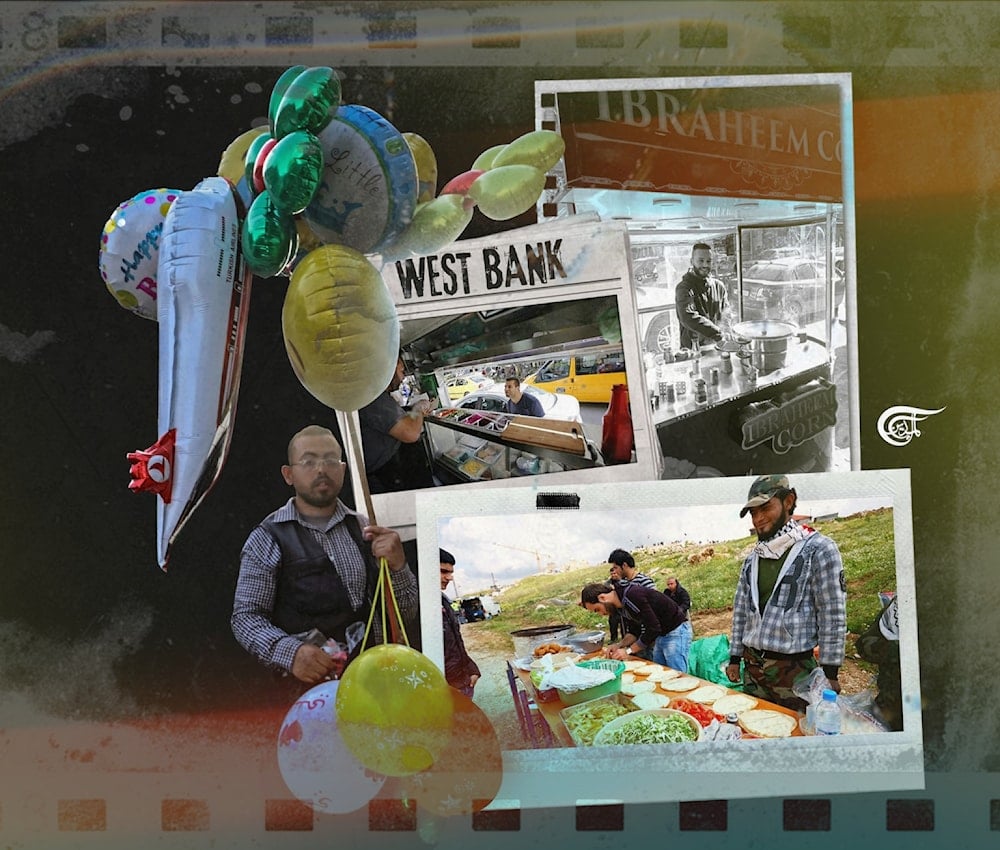Defiance in the West Bank: 'If I must die, you must live'
Palestinian resilience is best summed up by Abeer's quote, "If I must die, you must live - Palestinians are refusing to give up, and neither will we."
-

Resistance comes in all forms from Palestinians, refusing to accept a lesser role in life is just another one. (Al Mayadeen English; Illustrated by Zeinab el-Hajj)
October 7th changed the lives of Palestinians indefinitely. The world has either stood by helplessly, or actively participated in the destruction of what the Gazans used to call life.
Survival became a top priority for all Palestinians. In the West Bank, those who managed to evade settler attacks, being shot at and abducted at the hands of the IOF, have had to face up to the reality of still having to provide for their families, in a vastly different climate.
Thousands of Palestinians work in "Israel", often doing difficult jobs like construction and labor. As the lights, water, and electricity were shut off in Gaza, all work permits for all Palestinians were canceled, leaving tens of thousands unemployed overnight. Yahya, a married family man, was one of them, and has yet to find a new stream of income, though his responsibilities have remained the same.
"One day we were working, earning, providing, and in the blink of an eye we lost our livelihood" he explains. "Life as a Palestinian laborer working in Israel isn't easy. You have to deal with certain people discriminating against you, soldiers making things difficult when they feel like it. At the same time, it's not that bad either. You are there to do a job and some people can respect you. The biggest and most important thing though, is that we are working. That's the bottom line."
Yahya continues, "Usually, the pay you receive in Israel is more than you would for work here in the West Bank, but now, all those people who have lost their jobs in Israel came back here and all of them are competing for the very few vacancies which were available in a job market which itself also suffered after the 7th. There are tens of thousands who are in the same position as I am. This is the literal definition of zero job security."
"It's a very difficult situation. We don’t know when it's going to change, where our next pay check will come from and what the future holds, but expenses never stop, our responsibilities never stop" he adds, before concluding with typical Palestinian defiance, "but Alhumdullilah. Allah has blessed us with everything and we are grateful for it all."
Walk down one of the main streets of al-Khalil (Hebron), and you will see several pop-up food stalls which were not previously there. The majority of them had previously worked in "Israel", now they are selling falafel, arayes, and kunafeh from these makeshift vans. They make the most out of this bad situation and always find a way.
With the middle class toiling away with uncertainty, fresh Palestinian university graduates and young professionals are entering a job market that is only slightly more difficult than usual. "There is a perception about Palestinians and the MENA region that the whole place is burning down, that it's all a warzone; some people think we are still living in tents", reveals Abeer Abu Ghaith, a self-made Palestinian recruiter and founder of MENA Alliances who has taken it upon herself to help Palestinians by launching an initiative to lobby 200 companies worldwide to hire Palestinian digital workers.
"Palestinians are facing a huge economic crisis, and far too many have lost their jobs and homes. All the companies we worked with in Gaza have been destroyed, but they are not giving up, and inspired by their courage, resilience, and self-determination, we will not give up either."
Abeer is proud of the talent Palestine produces, with 4,000 tech graduates yearly, but laments the abhorrent stereotypes and misconceptions they face in the marketplace. "Our talent is very smart and innovative. They bring a completely different perspective because they come from a different culture where we have limited resources; this is called frugal innovation, making something out of nothing." She goes on to give an example of the perception she has to deal with as a recruiter, "We have trained DevOps engineers and specialized machine learning data scientists - but when I say that to some of my friends or companies in the United States they say, 'oh okay we can give them some data entry job."
What Abeer wants, is what Palestine needs. Change. Real change. "We need long-term and sustainable solutions, to empower Palestinians to dig themselves out of difficulty instead of depending on charity and short-term aid. Palestinians are telling me every day that what they need is employment, that their freedom comes from the ability to work and to support themselves."
What is clear, is that whether it's the laborers who are now street food vendors, or graduates deemed not good enough, the Palestinian spirit is defiant. Resistance comes in all forms from Palestinians, refusing to accept a lesser role in life is just another one.
Palestinian resilience is best summed up by Abeer's quote, "If I must die, you must live - Palestinians are refusing to give up, and neither will we."

 Imran Suleiman
Imran Suleiman
 5 Min Read
5 Min Read










